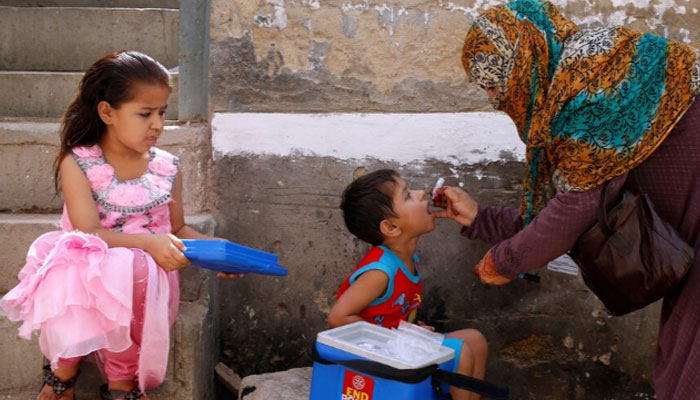

- Chakwal boy paralysed by Wild Poliovirus 1, says officials.
- At least nine cases have been reported from Balochistan.
- In Sindh, poliovirus was detected in at least two children.
ISLAMABAD: A six-year-old boy from Chakwal, Punjab was diagnosed with poliovirus just a day after two new cases surfaced in the country, taking the total tally to 12.
A report by The News citing a Polio Eradication Initiative (PEI) official stated Saturday that the boy has been paralysed by the Wild Poliovirus 1, making it the first case from the province of Punjab.
At least nine cases have so far been reported from Balochistan and two were detected in Sindh, said the official, adding that the genetic sequencing of the case is in process.
The two other cases, earlier confirmed detected on Saturday by the national PEI officials, were from districts Jhal Magsi and Killa Abdullah in Balochistan.
"The Regional Reference Laboratory for Polio Eradication at the National Institute of Health (NIH) Islamabad has confirmed the detection of Type-1 Wild Poliovirus (WPV1) in the stool specimen from a 75-month-old male child from District Chakwal of Punjab province. The child had onset of paralysis on July 16, 2024," the PEI official maintained.
The laboratory confirmed the cases from union council Patri in Jhal Magsi and union council Maizai in Killa Abdullah. A three-year-old child from Jhal Magsi and a 1.5-year-old child from Killa Abdullah have been paralysed by the virus.
The Jhal Magsi case, which showed symptoms on July 5, is linked to a virus strain found in Usta Muhammad. The Killa Abdullah case, symptomatic since June 10, is under genetic analysis, officials in the Polio Eradication Initiative (PEI) of Pakistan said.
Epidemiologists say the polio programme in Pakistan has encountered significant hurdles, including local protests, security issues, and vaccine hesitancy. These factors disrupted vaccination campaigns, particularly in Balochistan, where nine of this year’s cases emerged from six districts.
On the other hand, WPV1 was found again in the environmental samples of four previously infected districts, including Islamabad, officials said, adding that the total count of polio-infected districts for the year 2024 is now 58.
“The Regional Reference Laboratory for Polio Eradication at NIH Islamabad has confirmed the detection of WPV1 from the four previously infected districts, including Islamabad, Karachi East, Karachi Keamari, and Multan in Punjab,” an official of the PEI said.
In Karachi, the environmental sample was collected on July 18, 2024, from the Chakora Nala environmental sample collection site, which is the 24th positive sample from District Karachi East this year. The isolated virus is classified as YB3A4A + YB3A4B cluster, which are linked to the virus found in Pishin in Balochistan and Hyderabad in Sindh.
In Karachi Korangi, the environmental sample was collected on July 18, 2024, from the Korangi Nala environmental sample collection site, which is the 7th positive sample from Korangi this year. The isolated virus is classified as the YB3A4B cluster and is 99.89% genetically linked to the virus detected in an environmental sample in the same district on June 13, 2024.
The environmental sample in Islamabad was collected on July 20, 2024, from the Jhangi Syedan environmental sample collection site, which is the fifth positive sample from Islamabad this year. The isolated virus is classified as the YB3A4A cluster and is 99.77% genetically linked to the virus detected in an environmental sample in the same district on June 3, 2024.
Similarly, in Multan, the environmental sample was collected on July 9, 2024, from the Ali Town environmental sample collection site, which is the third positive sample from District Multan this year. The isolated virus is classified as the YB3A-4A cluster and is 99.4% genetically linked to the polio case in Killa Abdullah.












